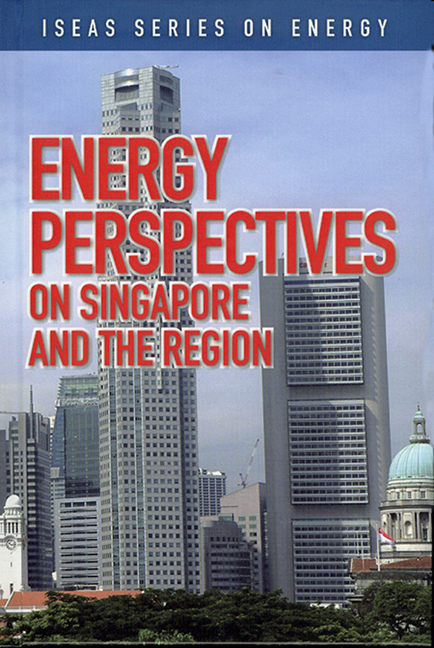Book contents
- Frontmatter
- Contents
- Foreword
- Preface
- The Contributors
- 1 Overview of Singapore's Energy Situation
- 2 Singapore's Changing Landscapes in Energy
- 3 Singapore's Role as a Key Oil Trading Centre in Asia
- 4 Large-Scale Solar PV Power Generation in Urban High-Rise Buildings in Singapore
- 5 The High-Carbon Story of Urban Development in Southeast Asia
- 6 Renewable Energy and the Environment: Technology and Economic Perspectives
- 7 Delivering Results in a Booming Rig Market
- 8 The Success Story of Rig Building in Singapore
- 9 The Singapore Oil Situation
- 10 Singapore Petroleum Company: Adding Value to the Singapore Oil Industry
- 11 Oil Storage: The Singapore Story
- REGIONAL and INTERNATIONAL
- 12 The Outlook for Energy: A View to 2030
- 13 India's Energy Situation: The Need to Secure Energy Resources in an Increasingly Competitive Environment
- 14 The Implications and Impacts of China's Oil Demand on the Asia Pacific
- 15 Energy Security Cooperation in Asia: An ASEAN-SCO Energy Partnership?
- 16 China's Energy Security: Geo-politics versus Interdependence
- 17 The Strategic Challenges for the United States and China in Global Energy Supply
- 18 China's Coal: Curse or Blessing
- 19 Japan's New Energy Strategy
- 20 Who Wins in the Asian Scramble for Oil?
- 21 New Horizons for Liquefied Natural Gas (LNG) East of Suez
- 22 Bio and Synthetic Fuels: An Alternative for Sustainable Mobility
- 23 Price Discovery for Middle East Refined Product Exports: A Natural Role for Dubai
- 24 The Outlook for Gas in Southeast Asia
- 25 Sakhalin-2 Project, a New Energy Source for the Asia Pacific: History in the Making
- Index
15 - Energy Security Cooperation in Asia: An ASEAN-SCO Energy Partnership?
from REGIONAL and INTERNATIONAL
Published online by Cambridge University Press: 21 October 2015
- Frontmatter
- Contents
- Foreword
- Preface
- The Contributors
- 1 Overview of Singapore's Energy Situation
- 2 Singapore's Changing Landscapes in Energy
- 3 Singapore's Role as a Key Oil Trading Centre in Asia
- 4 Large-Scale Solar PV Power Generation in Urban High-Rise Buildings in Singapore
- 5 The High-Carbon Story of Urban Development in Southeast Asia
- 6 Renewable Energy and the Environment: Technology and Economic Perspectives
- 7 Delivering Results in a Booming Rig Market
- 8 The Success Story of Rig Building in Singapore
- 9 The Singapore Oil Situation
- 10 Singapore Petroleum Company: Adding Value to the Singapore Oil Industry
- 11 Oil Storage: The Singapore Story
- REGIONAL and INTERNATIONAL
- 12 The Outlook for Energy: A View to 2030
- 13 India's Energy Situation: The Need to Secure Energy Resources in an Increasingly Competitive Environment
- 14 The Implications and Impacts of China's Oil Demand on the Asia Pacific
- 15 Energy Security Cooperation in Asia: An ASEAN-SCO Energy Partnership?
- 16 China's Energy Security: Geo-politics versus Interdependence
- 17 The Strategic Challenges for the United States and China in Global Energy Supply
- 18 China's Coal: Curse or Blessing
- 19 Japan's New Energy Strategy
- 20 Who Wins in the Asian Scramble for Oil?
- 21 New Horizons for Liquefied Natural Gas (LNG) East of Suez
- 22 Bio and Synthetic Fuels: An Alternative for Sustainable Mobility
- 23 Price Discovery for Middle East Refined Product Exports: A Natural Role for Dubai
- 24 The Outlook for Gas in Southeast Asia
- 25 Sakhalin-2 Project, a New Energy Source for the Asia Pacific: History in the Making
- Index
Summary
INTRODUCTION
Asia, which is understood to mean Central Asia, Northeast Asia, South Asia and Southeast Asia, is as a whole, set for a period of economic, population and urban expansion and this will mean higher regional energy consumption in the years to come, especially in China and India. The International Energy Agency's World Energy Outlook for 2004 through to 2030, indicates that energy consumption in North East Asia is expected to amount to 3.5 billion tonnes of oil equivalent by 2030, a rise of around 1.5 billion tonnes over the next twenty-five years. China is mainly responsible for this projected increase in energy consumption. East Asia's consumption — excluding China, Japan and South Korea — is projected to increase to 1.4 billion tonnes in 2030. Over the same period, India's appetite for energy is also notably increasing. It is expected to consume as much energy as Japan and Korea combined by 2030. The following figure (Figure 15.1) shows the growing consumption of oil equivalent within Asia in comparison with North America, the European Union and Russia.
While the supply and demand of energy resources in Asia has a direct impact on the economic and political development of the region as a whole, energy cooperation among Asian countries has thus far been limited and far from ideal. Energy security is an issue of great importance in Asia and it is increasingly influencing the behaviour of Asian governments. In Asia, the role of the governments in addressing the energy issue is especially important since governments in the region retain considerable influence over their respective energy sectors through policies, regulation, ownership or investment. As a result, energy security decisions have not been left to market forces alone; instead, it requires a high and concerted level of political engagement by the respective governments. Energy security is in fact lodged within a larger framework of inter-state relations.
- Type
- Chapter
- Information
- Energy Perspectives on Singapore and the Region , pp. 156 - 175Publisher: ISEAS–Yusof Ishak InstitutePrint publication year: 2007



